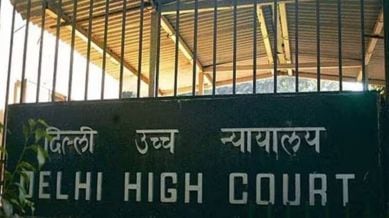Stay updated with the latest - Click here to follow us on Instagram
Provisions of the SC/ST Act can’t be used to curtail bank’s mortgage rights: Delhi HC
The Delhi High Court ruled that provisions of the SC/ST Act cannot be invoked to stop a bank from enforcing its lawful mortgage rights, while staying proceedings against Axis Bank officials initiated by the National Commission for Scheduled Tribes.

The Delhi High Court has said that the provisions of the SC/ST Act relating to wrongful occupation or dispossession of land belonging to people from Scheduled Castes and Scheduled Tribes cannot be used to prevent a bank from exercising its lawful mortgage rights.
Justice Sachin Datta made the prima facie observation while staying the proceedings initiated by the National Commission for Scheduled Tribes against Axis Bank, its Managing Director (MD) and the Chief Executive Officer (CEO).
monthly limit of free stories.
with an Express account.
“Prima facie, in the context of the facts of the present case, Sections 3(1)(f) and (g) of the Atrocities Act are not attracted inasmuch the same cannot be invoked to preclude/ prevent the exercise of mortgage right/security interest of the petitioner,” the judge said in an order passed on October 16.
The Commission had ordered Axis Bank’s MD and CEO to appear in person after a representation was made by a person alleging violation under Sections 3(1)(f) and (g) of the Scheduled Castes and Scheduled Tribes (Prevention of Atrocities) Act (SC/ST Act).
Section 3(1)(f) penalises wrongfully occupation or cultivation of land belonging to a member of the SC/ST community, while Section 3(1)(g) relates to the punishment of wrongful dispossession of a member of the SC/ST community of his land or premises.
According to the petition before the court, a credit facility of Rs 16.69 crore was sanctioned by Axis Bank to Sundev Appliances Ltd, secured by a mortgaged property in Maharashtra’s Vasai, in 2013.
After the borrower defaulted, the account was declared a non-performing asset in 2017, prompting the bank to invoke its rights under the law, which was followed by a civil dispute over ownership of the mortgaged property.
One of the persons involved in the dispute, thereafter, approached the National Commission for Scheduled Tribes.
The high court stayed the order saying the proceedings pending before the Commission were without jurisdiction.
“The proceedings pending before respondent no.1 (National Commission for Scheduled Tribes), particularly, the summons issued therein which requires the MD & CEO of the petitioner (bank) to appear before the respondent no.1, are without jurisdiction. No rationale has been recorded for requiring senior officials of the petitioner to appear personally before the respondent no.1,” the judge said, and posted the matter for further hearing on February 5, next year.